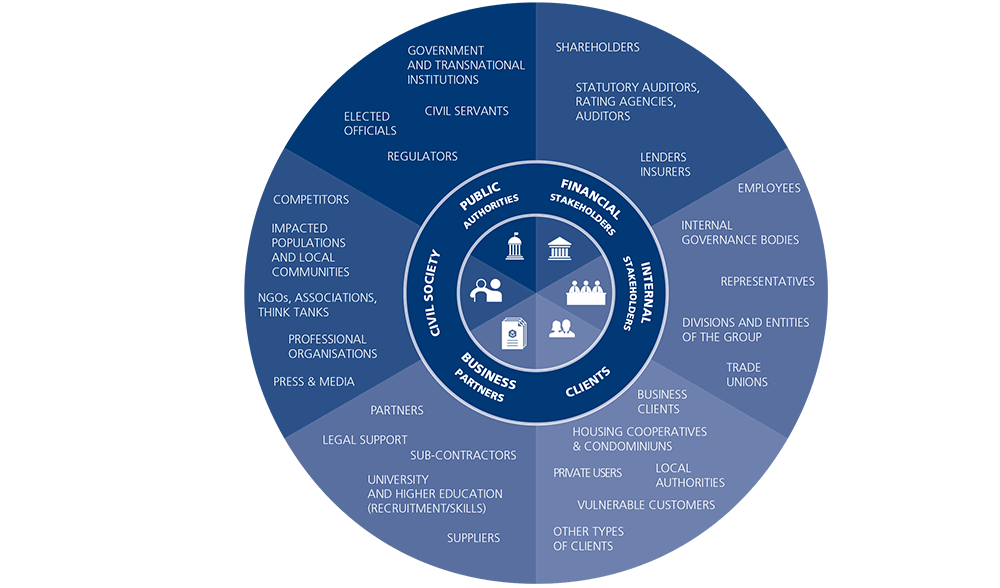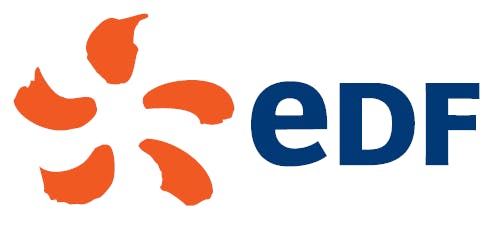New EPRs in Penly
The programme to construct three pairs of EPR2 reactors and the plan under consideration to build an initial pair on the Penly site were publicly debated under the aegis of the CNDP from 27 October2022 to 27 February 2023. EDF’s role is as project owner for the first pair of EPR2 units and nuclear sector lead contractor for the proposed programme of 6 new EPR2 reactors. This debate hada local component due to the integration of the project into the Penly area,anda national one given the proposed industrial programme. It furthers the national consultation on the energy mix set up by the French State under the aegis of4 CNDP guarantors focusing on France’s energy choices. This gives the public the opportunity to contribute to the project owner’s decision: options are still open.
3.4.1.1.1.3 Fresh stimulus for dialogue with NGOs
The EDF group has long-standing relations with NGOs, spanning all the Group’s various business lines ona local, regional, national, and international level. For more than twenty years, it has had an institutional outworking in the form of the Group’s Stakeholder Panels (formerly the Environment Panel, Societal Council, Sustainable Development Council, now the EDF Stakeholder Advisory Committee). Regular discussions are held with leading non-governmental organisations covering issues such as the environment and human rights. These relations have led to many practical joint implementations. For instance, our bird life protection policy in respect of electricity infrastructures has been put together in consultation with France’s League for the Protection of Birds (LPO).The EDF group recognises the vital role of NGOs in our societies, in particular as regards energy-related decisions, and is seeking do so more going for ward.
Closer ties
Closer relations with NGOs aim to prevent the emergence of any high-risk situations by maintaining regular monitoring and establishing forums for dialogue. This also allows the Company’s decisions to be challenged, improves its expertise, and strengthens the legitimacy of Group projects.The Group encourages its employees to be involved in NGOs.
New policy
A new NGO relations policy was drawn up and approved by the CSR Committee. This policy takes account of the new NGO landscape and changes to their modes of action under the supervision of an “NGO Relations” project manager answering to the Impact Department Manager. Four areas were identified: coordination, internal communication,dialogue, and human resources.
3.4.1.1.2 An open dialogue with all, involving all the Group’s businesses and subsidiaries
The culture of dialogue promoted by the Group underpins the way it engages in stakeholder relations.
3.4.1.1.2.1 Mapping Group stakeholders to inform actions
Stakeholder relations are at the heart of the EDF group’s CSR policy:
- The Group has drawn up an overall map of its stakeholders, approved by the Executive Committee; this provides Group divisions and companies with a framework within which to organise dialogue(1).
- As part of ISO 9001 and 140001 certification, the Group’s divisions and companies systematically map their stakeholders in order to define appropriate modes of dialogue adapted to their specific context.
- Relations with local communities fall within the scope of internal control.

This diagram shows the mapping Group stakeholders to inform actions.
PUBLIC AUTHORITIES:
- Government and transnational institutions
- Elected officials
- Civil servants
- Regulators
FINANCIAL STAKEHOLDERS:
- Shareholders
- Statutory auditors, rating agencies, auditors
- Lenders insurers
INTERNAL STAKEHOLDERS:
- Employees
- Internal governance bodies
- Representatives
- Divisions and entities of the group
- Trade unions
CLIENTS:
- Business clients
- Housing cooperatives & condominiums
- Local authorities
- Private users
- Vulnerable customers
- Other types of clients
BUSINESS PARTNERS:
- Partners
- Legal support
- Sub-contractors
- University and higher education (recruitment/skills)
- Suppliers
CIVIL SOCIETY:
- Competitors
- Impacted populations and local communities
- NGOs, associations, think tanks
- Professional organisations
- Press & media
(1) Identify stakeholders; launch consultation as far upstream as possible; provide transparent and clear information to stakeholders on the project; gather stakeholder opinions on the project and address them; set up a system for dealing with suggestions and complaints; ensure that local populations are able to participate in the consultation process; ensure that consultations are publicly reported.
